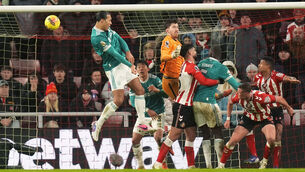Spain’s constant pantomime
In his first season in charge, he left a trail of destruction — alienating Spanish League officials; castigating and provoking Barcelona at every turn; upbraiding UEFA (and most curiously of all, UNICEF) with his conspiracy theories; while becoming a hero to Real Madrid aficionados for defending their honour. A week after he poked Barça’s current coach Tito Vilanova in the eye during a pitch-side fracas at the end of the 2011 Spanish Super Cup final, fans at the Bernabéu wielded a sign behind the south-end goal: “Mourinho, your finger shows us the way”.
Eight months later, he finally delivered on his mandate, knocking Barcelona off its perch, having galvanised a crack Real Madrid outfit, hallmarked by whirlwind counter-attacks in which half of the team’s goals came within 20 seconds of gaining possession, to secure a record-breaking, 100-point championship-winning tally.














